Have you ever wished you could have an adorable fluffy sidekick who doubled as a bodyguard, business partner and potential main course?
Meet the guinea fowl, the chicken that isn’t a….chicken.
Why keep guinea fowl? As Modern Farmer so succinctly puts it, like the popular chicken, they score major points for “tastiness.”
But guinea fowl have many other fine qualities as well, whether you keep just one bird or several flocks. Learn all about these versatile birds in this article.
Background and History
If you were not aware that the modern domestic guinea fowl can trace its roots back to wild Africa, you are in good company. In fact, the guinea fowl takes its breed name from its birthplace, West Africa’s Guinea Coast.
Guinea fowl were first recorded as early as 400 B.C. Modern guinea fowl go by several nicknames, including tufted guinea fowl, helmeted guinea fowl, vulturine, gleanies and pintades, pearl hens and keets (chicks).
Today, as Oklahoma State University points out, there are two main strains: Pearl and White.
The most common type of modern guinea fowl is the helmeted guinea fowl. Another fact a lot of people don’t know is that guinea fowl share a genetic link to partridges, pheasants, quail, grouse, turkey and of course, chicken. All belong to the Galliformes.
Being an African native, guinea fowl tend to do best in warmer climates. Domestically, guinea fowl are most frequently found in the southern and central regions of the country.
Breed Standard and Appearance
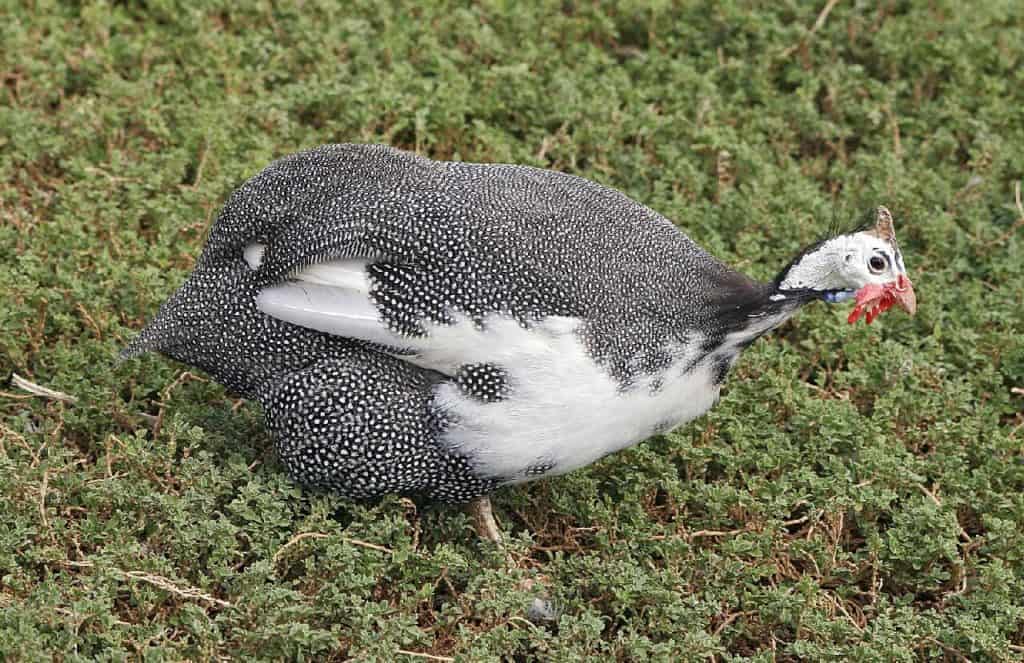
According to Poultry Hub, there are three main types: pearl, lavender, and white.
While guinea fowl are related to domestic chicken, they do not mix well with a regular chicken flock. If chicken and guinea fowl crossbreeding occurs, expect sterile offspring.
Guinea fowl are similar in size to adult chickens. The most popular type is the pearl because they have the most decorative feathers. Guinea fowl feathers are prized for decorative uses.
Overall, the guinea fowl is a sleek, trim, athletic bird with a mostly bare head (hence the nickname of one type, the “vulturine”). They are hardy and strong and can easily jump and fly.
Personality and Temperament
Guinea fowl are sweet-natured as chicks and notoriously ill-tempered in adulthood. This last fact has been well documented by chicken and poultry keeper manuals, including no less than the 1912 Standard Cyclopedia of Modern Agriculture.
They travel in tight-knit flocks and have a well-earned reputation for their watch-bird skills. Guinea fowl have been observed to fight off the most fearsome hawks and other birds of prey to keep their keets safe. Overall, these are quite active and energetic birds – much more so than their close cousin, the domestic chicken.
In fact, guinea fowl are so good at guard duty that some owners keep them specifically for this purpose!
But guarding home and hearth isn’t the guinea fowl’s only special skill.
Guinea fowl are also pest control experts. These birds love to eat bugs, including grasshoppers, crickets, beetles, flies, mosquitos, worms, caterpillars, ticks, wasps and other bothersome insects that plague people and livestock. Some farmers now even use guinea fowl in lieu of pesticides to control barnyard pests.
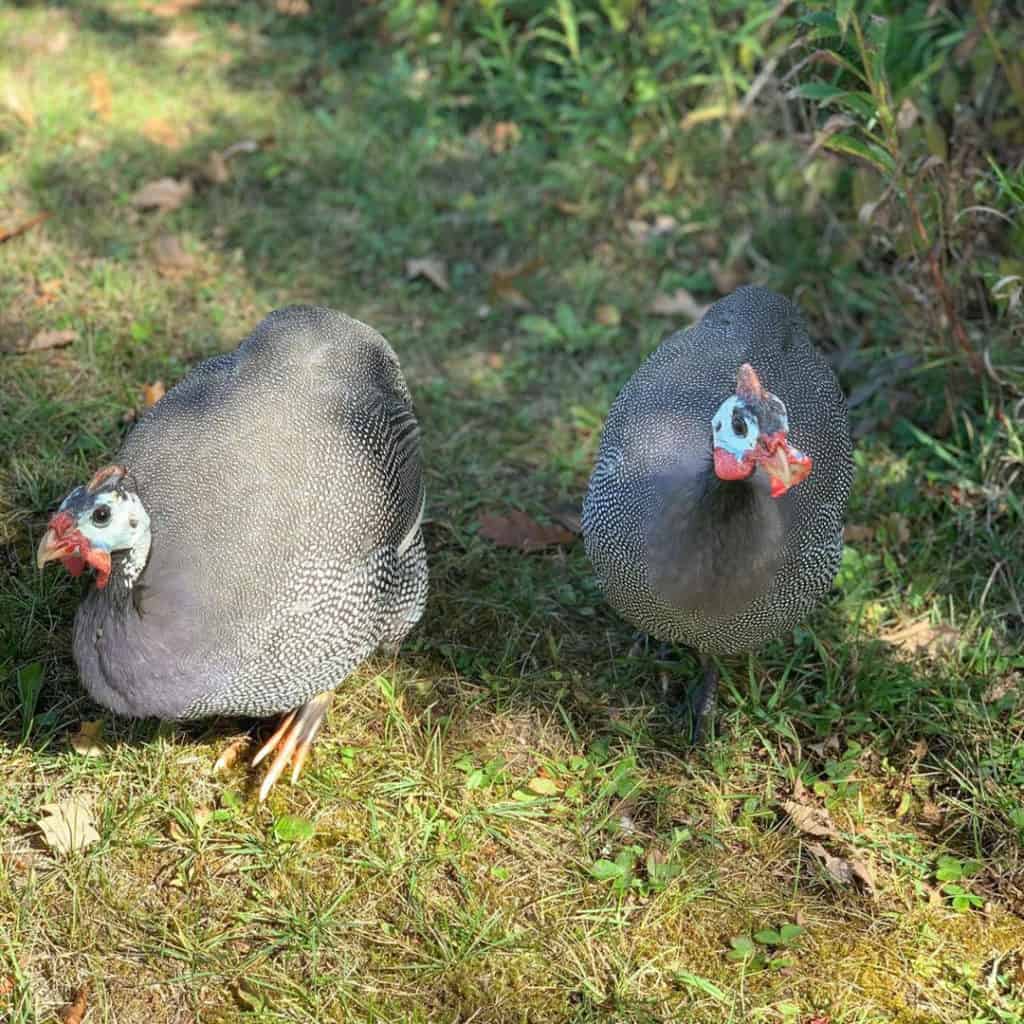
Anyone who keeps guinea fowl needs to know these are extremely social birds and should always be kept in groups. However, a flock of guinea fowl can be difficult for the uninitiated to manage. They don’t seem to understand property boundaries and will happily roost, nest and forage anywhere that strikes their fancy.
Guinea fowl are also very vocal. Their general noise and piercing calls can be irritating to some. If you value keeping a cordial relationship with your neighbors, it can be worth checking first before choosing to keep guinea fowl. This is especially true in an urban setting.
Interestingly, the guinea fowl’s loud call can have a beneficial effect your neighbors might appreciate: scaring off rodents like rats and mice and even larger animals like foxes and raccoons. They will also actively hunt snakes as a way to protect their keets from predation.
Some keepers have even noted that guinea fowl appear to have special calls to alert others about what type of predator is approaching.
One potential workaround to lessen the noise level is to hatch and raise your own keets. This way, you can help shape their behavior as adults.
The guinea fowl hen’s call has been likened to the word “buck-wheat” or, alternately, “qua-track” or “put-rock.” The calls can be quite loud and persistent. This is a sound that is unique to the hens of the species.
Since guinea fowl adults can be hard to sex, knowing which calls are specific to hens can be a helpful way to tell the adult hens apart from the males!
Egg Laying
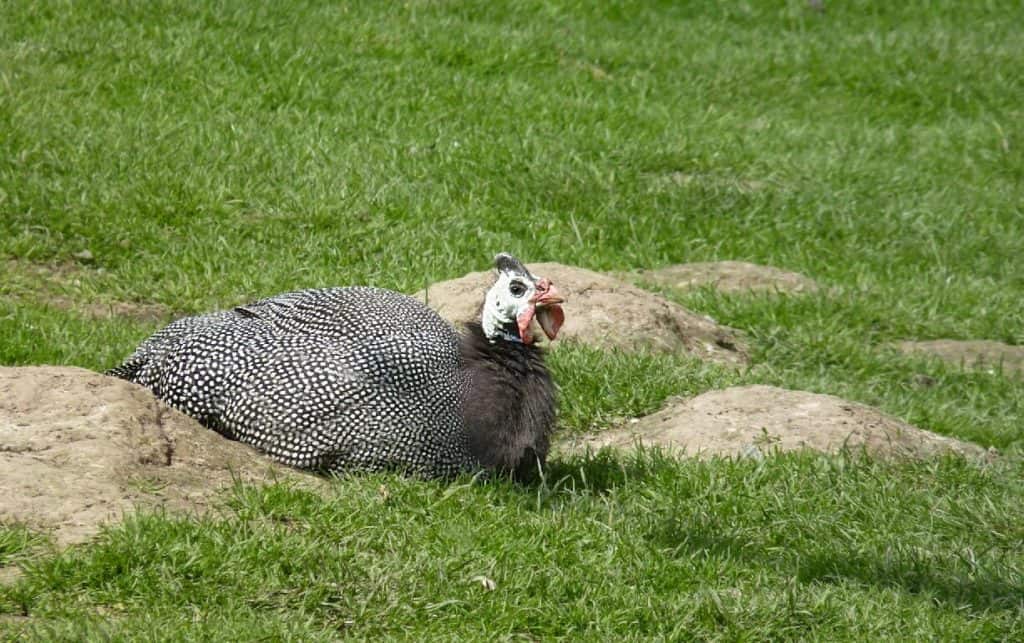
Like the chicken, guinea fowl flocks like to do everything together, often all at once and in the same place, including egg laying.
While they often prefer to roost in trees, guinea fowl hens always lay their eggs on the ground. The eggs are thicker shelled than chicken eggs and their meat is darker and richer than chicken meat.
The eggs look similar to chicken eggs and can be eaten in just the same ways. Guinea fowl eggs are known for their higher protein content and slightly richer flavor.
If you plan to keep guinea fowl for their eggs, it will be important to provide them with a secure enclosed structure so you can keep track of the nests and help the guinea fowl parents guard against predators.
Just like with chickens, you need to provide them with nest boxes so they will lay their eggs inside. Like chickens, guinea fowl do most of their laying before noon, so after that you can let them out for the day.
Health Issues and Care
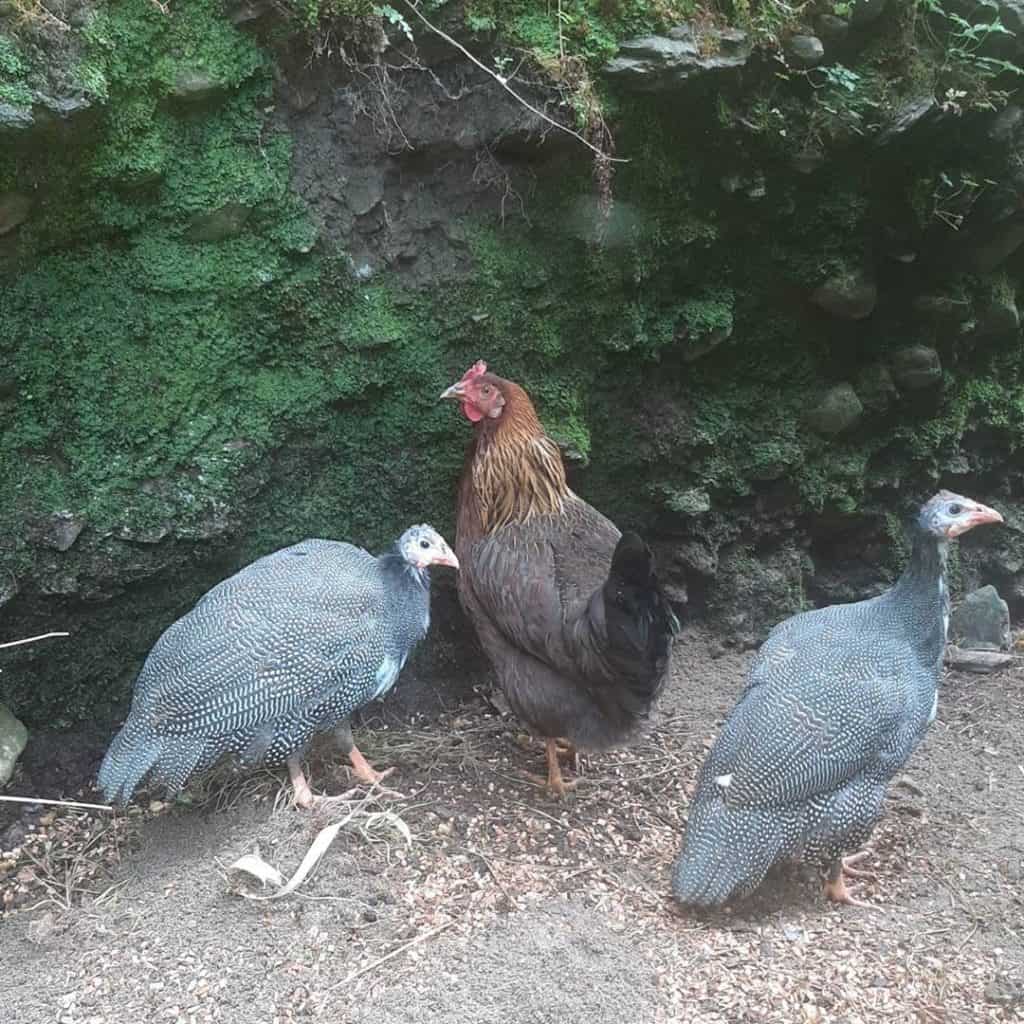
It is very important to guard guinea fowl chicks (keets) against too much moisture and damp. Guinea fowl as a species originated in the drier areas of Africa,
However, once your guinea fowl grows up, you can expect a hardy, healthy bird as long as you continue to take general precautions to keep their housing and nesting areas safe, warm, dry and draft-free.
Because guinea fowl may view water stations as multi-purpose bathing and toilet areas, you will also want to provide fresh water at all times.
Just like other barnyard poultry like the chicken, guinea fowl can suffer from impacted crop (“sour crop“) and egg-binding, both of which can require veterinary care. Be sure you have identified a local veterinary expert who is familiar with the chicken and other poultry before you decide to keep guinea fowl.
Many people choose to keep guinea fowl because they are so good at controlling against insects and animal pests. If this is the case, you can offer just a small amount of feed during the warm season to supplement their hunting.
During the cold season, you will want to supplement their diet more heartily with appropriate high-protein grains and leafy greens. Guinea fowl need more protein than a chicken will.
5 Tips for Raising Guinea Fowl
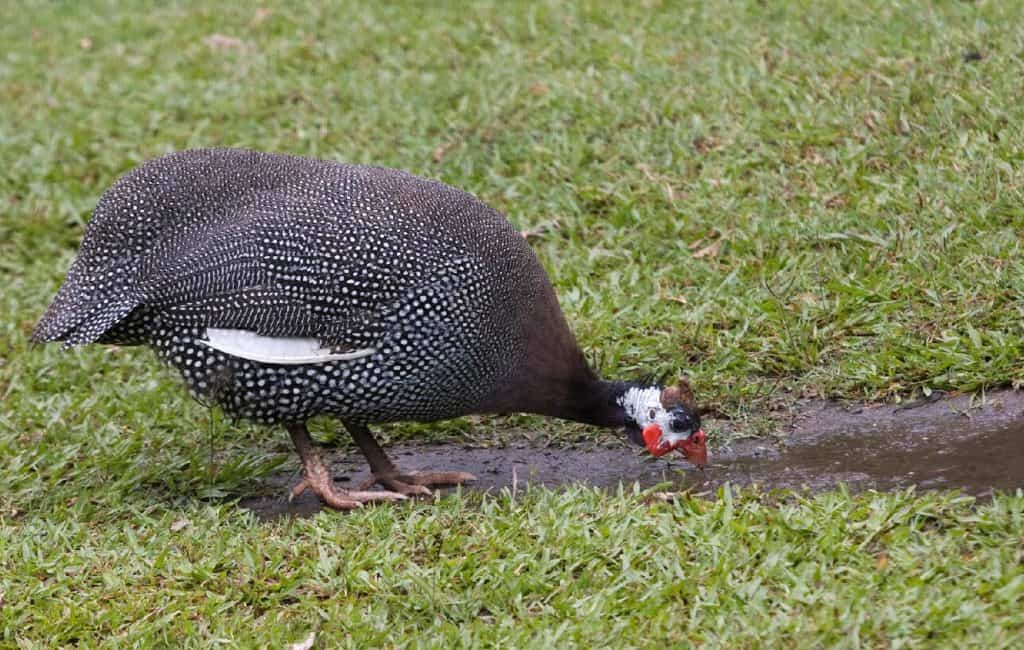
1. One-day-old keets are a good choice to start your flock.
If you plan to raise guinea fowl, experts suggest starting with day-old keets. This will improve the odds that you can shape their noise level, sociability and behavior into adulthood.
2. Confine them to the chicken coop for the first six weeks.
Guinea fowl are aggressive and territorial, but they are also vulnerable, especially in the first weeks of life. By confining them to the chicken coop for the first six weeks, keets learn it is their home.
This will help encourage them to return at night when they grow up.
3. Give them high roosts inside the coop.
Unlike the chicken, guinea fowl like to roost in trees at night. Inside the coop, they will need higher perches than what you would provide for a chicken.
4. Keep guinea fowl separate from the chicken flock and any other poultry.
Guinea fowl are more aggressive than other poultry and may bully a chicken or even a rooster, so it is best to keep the two species apart.
5. Guinea fowl are wild at heart.
The chicken is easily domesticated and content. But guinea fowl are essentially wild and will not do well in adulthood without some degree of freedom.
Summary
Guinea fowl have become increasingly popular in recent years both for their pest-control talents and for their unique personalities and tasty eggs and meat.
But they are undeniably louder than the chicken and other livestock poultry. Be sure your neighbors are accommodating before you commit to raising guinea fowl.

Joseph Hudson has been raising chickens for over 15 years. In 2018, he completed the Agriculture & Natural Resources program at Mt. San Antonio College. He currently raises over 1400 chickens on his 7.5-hectare farm. He keeps sharing his experience on raising healthy and happy chickens on Chicken Scratch The Foundry.
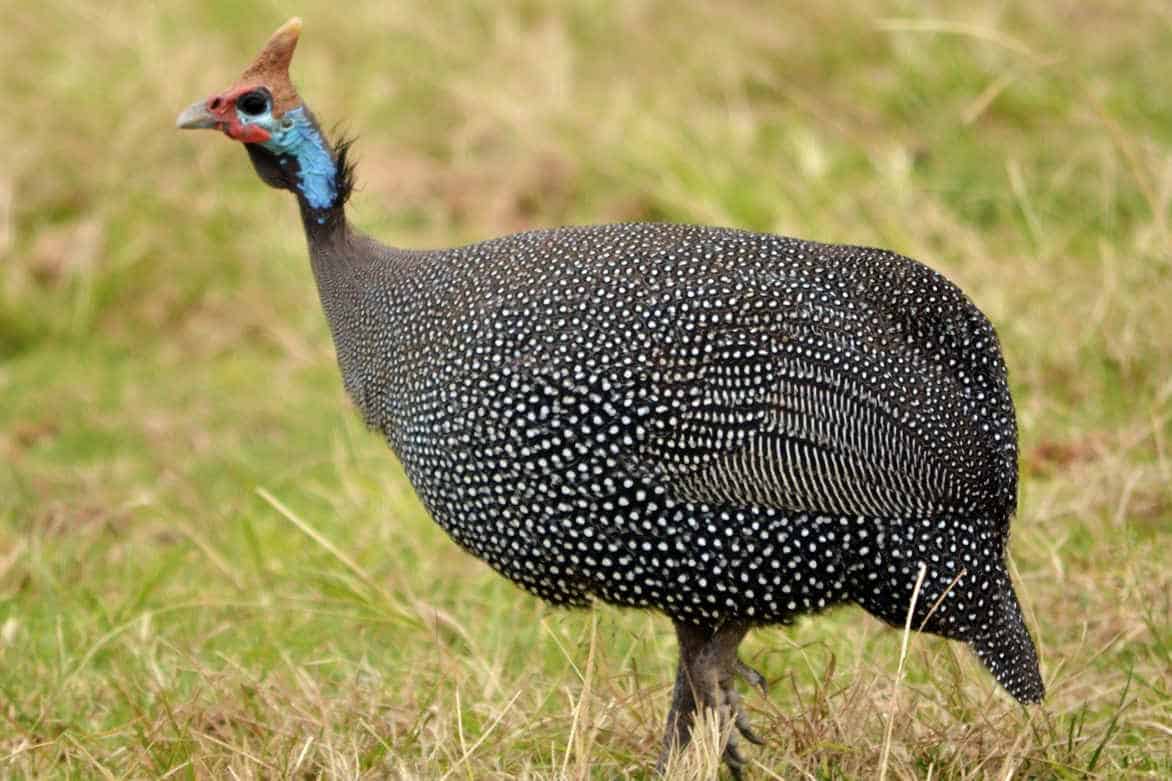
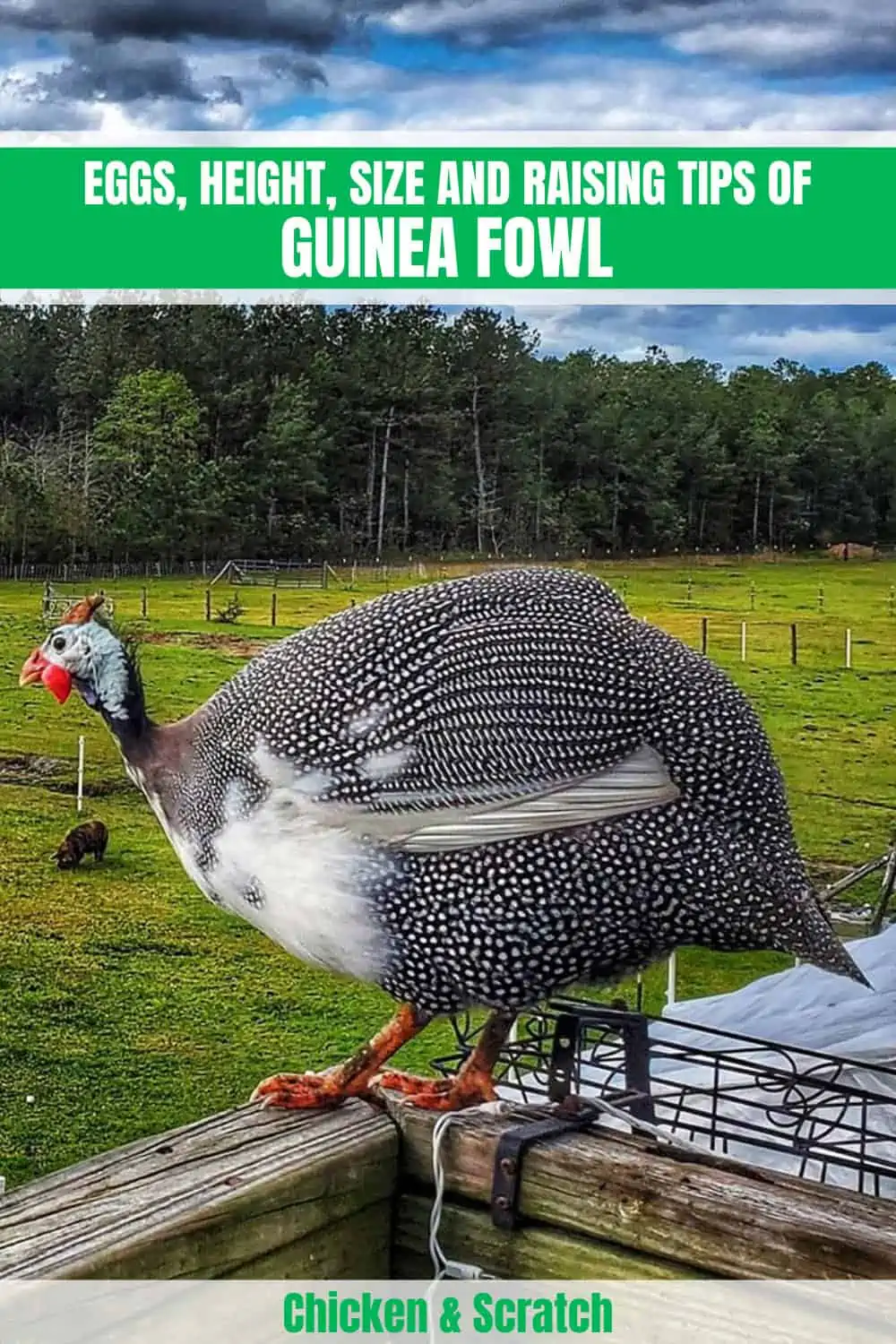







GREAT, EDUCATIONAL COMMENTARY…Thank you
Do guinea eat rats?